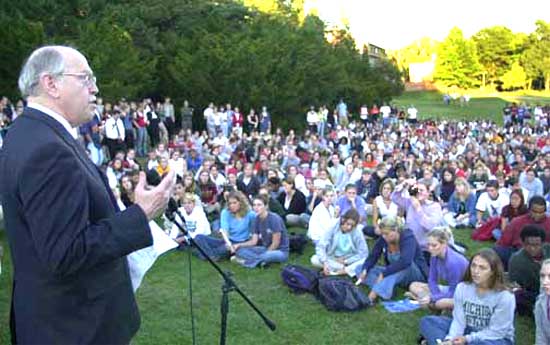
The path we foresee resembles what happened during the baby-boomer period. Then, in the heat of the Cold War, the imperative to make technological progress led the nation's universities to expand. As the nation's youth came to understand that they needed more education, the government made education a priority. The sobering lessons from the current economic situation could contribute to a similar pattern of thought and action. We propose to: 1) enroll a higher percentage of high-school graduates, now 64%; 2) increase the number of adults returning to college; and 3) increase college graduation rates while maintaining educational quality. To realize these goals, the historic partnership between higher education and the state and the federal government should be re-established. It is the only way that this country will increase its number of degree holders by 42%, a task that will obviously require more resources than public universities and colleges currently have. Peru RPCV Peter McPherson is a former deputy secretary of the U.S. Department of the Treasury, former President of Michigan State University, and is now Chairman of the Board of Dow Jones, Publishers of the Wall Street Journal.
Peter McPherson writes: Yes, We Can Expand Access to Higher Ed
Yes, We Can Expand Access to Higher Ed
More college degrees will be good for the economy.
By PETER MCPHERSON and DAVID SHULENBURGER
For generations, the United States has led the world in higher education. But today the U.S. has fallen to ninth in the proportion of young adults (age 25-34) who attain college degrees among the countries belonging to the Organization for Economic Cooperation and Development. In Japan, Korea and Canada, more than 50% of young adults hold college degrees. Only 41% do in the United States. The question is: Should we do more?
Our nation's economic future depends on it. Our educational advantage made us the world's leader in discovery, invention and innovation. Our labor force has been able to perform better and receive higher wages because of its intellectual capital. But as that capital lags behind that of its competitors, our country's prominence is at risk.
The bottom line is that education affects economics. The more educated a work force is the more value it adds to society. We can chart this by looking at the way income levels vary with educational degrees. Since 1980, the gap between the earnings of those with bachelor's degrees and those with just high-school diplomas has widened. The ratio between the median earnings of men with the former and men with the latter grew to 1.99 in 2007 from 1.43 in 1980.
In today's harsh economy, there is a strong correlation between education and employment. In May 2009, those with bachelor's degrees have an unemployment rate of 4.8%; associate's degree, 7.7%; high-school degree, 10.0%; and less than high-school degree, 15.5%.
Given the impact education has on the economy, the U.S should set a goal of college degrees for at least 55% of its young adults by 2025. This is in line with President Barack Obama's statement that "by 2020, America will once again have the highest proportion of college graduates in the world." This goal would require graduating an additional 875,000 students per year -- a 42% increase of people with at least an associate's or bachelor's degree.
History suggests higher education can meet this goal within the next 15 years. In the 15 years following World War II, post-secondary enrollment expanded by 82%. And in the baby-boomer period of 1962-76, enrollment expanded by a whopping 174%.
The path we foresee resembles what happened during the baby-boomer period. Then, in the heat of the Cold War, the imperative to make technological progress led the nation's universities to expand. As the nation's youth came to understand that they needed more education, the government made education a priority. The sobering lessons from the current economic situation could contribute to a similar pattern of thought and action.
We propose to: 1) enroll a higher percentage of high-school graduates, now 64%; 2) increase the number of adults returning to college; and 3) increase college graduation rates while maintaining educational quality.
To realize these goals, the historic partnership between higher education and the state and the federal government should be re-established. It is the only way that this country will increase its number of degree holders by 42%, a task that will obviously require more resources than public universities and colleges currently have.
The administration and Congress have taken the first steps to expand the number of degree holders, including increasing Pell Grant funding and GI educational benefits. These steps will help more low- and middle-income students attend college.
Figures suggest that the goal is attainable and important for the competitiveness of our people and country. Though some states are currently cutting funding to education, higher education needs help now. Our goal should not wait for better times.
Mr. McPherson, former chairman of Dow Jones & Company, is president of the Association of Public and Land-grant Universities, where Mr. Shulenburger is vice president.












